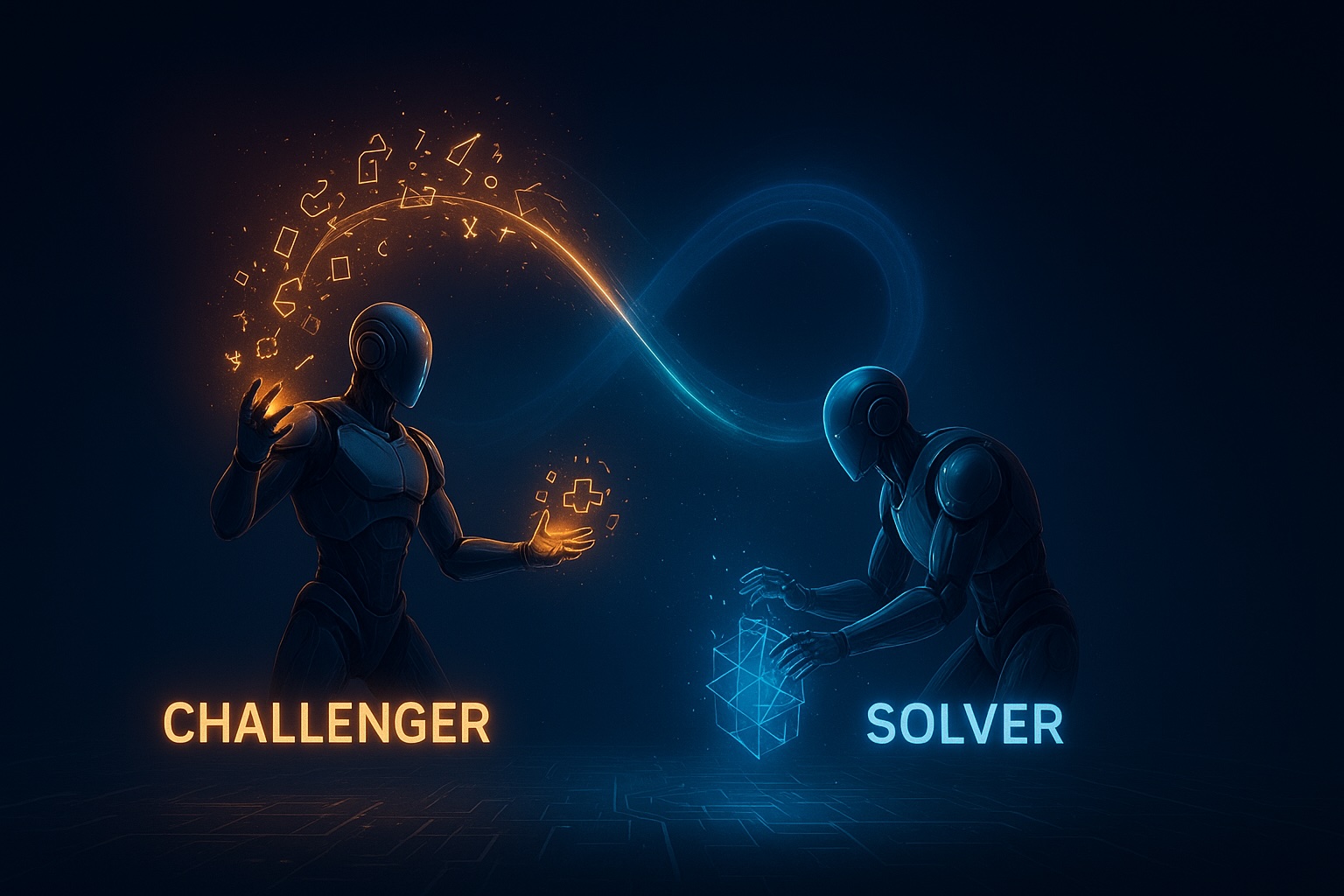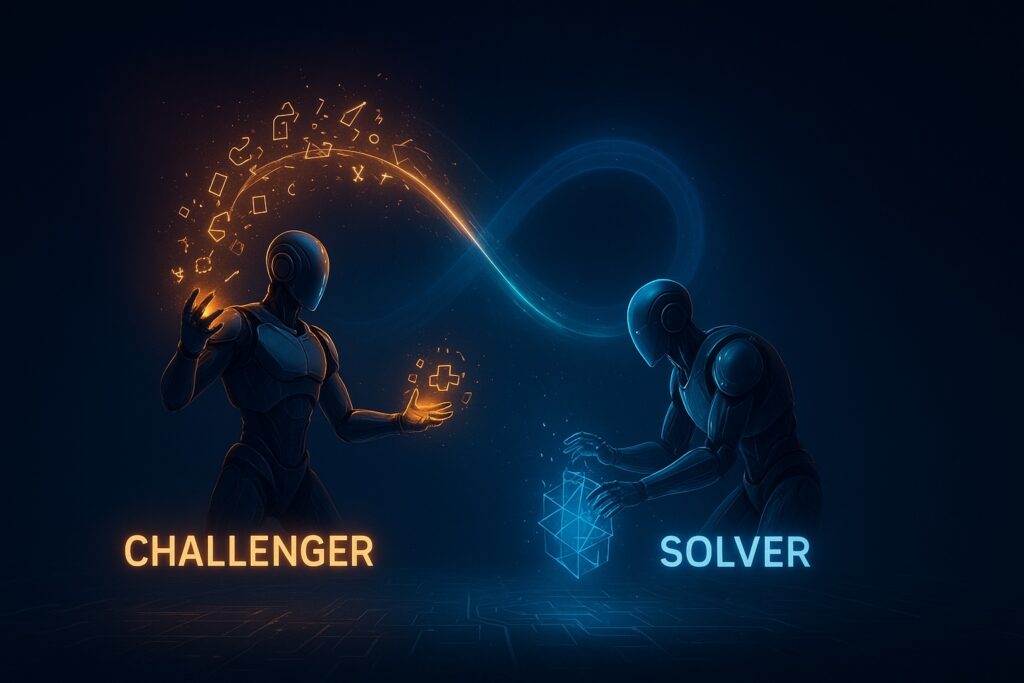
A brand new coaching framework developed by researchers at Tencent AI Lab and Washington College in St. Louis permits giant language fashions (LLMs) to enhance themselves with out having to any personally identifiable knowledge. The method, referred to as R-Zero, makes use of reinforcement studying to generate its personal coaching knowledge from scratch, addressing one of many essential roadblocks in creating self-evolving AI programs. R-Zero works by having two unbiased fashions co-evolve by interacting and difficult one another.
Experiments present that R-Zero considerably improves reasoning skill throughout completely different LLMs, which might cut back the complexity and value of superior AI coaching. For enterprises, this strategy might speed up the event of specialised fashions for complicated reasoning duties with out the huge prices of preserving labeled knowledge units.
The problem of self-evolving LLM
The concept behind self-evolving LLM is to create AI programs that may autonomously generate, refine, and be taught from their very own experiences. This presents a scalable path in the direction of extra clever and succesful AI. Nonetheless, a serious problem is that coaching these fashions requires a considerable amount of work and high-quality labels, which act as supervisory alerts for the AI to be taught from.
Counting on human annotators to create this knowledge will not be solely costly and gradual, but in addition creates a elementary bottleneck. It successfully limits the potential capabilities of an AI to what people can train it. To handle this, researchers have developed label-free strategies that derive reward alerts immediately from a mannequin’s personal output, for instance, by measuring its confidence in a response. Whereas these strategies remove the necessity for express labeling, they nonetheless depend on a set of pre-existing duties, thus limiting their software to actually self-evolving situations.
Different approaches contain fashions producing their very own work to be taught from. Nonetheless, in areas resembling open reasoning, the place there is no such thing as a easy method to verify if correctness (resembling a code executor), guaranteeing the standard of those self-generated knowledge is a big impediment.
How R-Zero works
R-Zero is a framework designed to coach LLM reasoning that may evolve from zero exterior knowledge. The method begins with a single base mannequin, which is split into two roles: a "Challenger" and a "Solver." These two fashions are optimized independently however evolve collectively by way of a steady cycle of interplay.
The objective of the Challenger is to create new duties which are simply inside the threshold of the present Solver’s capabilities, neither too straightforward nor unimaginable. The solver, in flip, rewards for fixing these more and more complicated duties. In feedback written for VentureBeat, Chengsong Huang, co-author of the paper and a doctoral pupil at Washington College in St. Louis, explains that this dynamic is essential as a result of producing high quality questions is usually extra sophisticated than discovering the solutions.
“What we present in a sensible setting is that the most important problem is to not generate the solutions … however reasonably to generate high-quality, novel, and progressively tougher questions,” Huang stated. “We imagine good academics are a lot rarer than good college students. The co-evolutionary dynamic automates the creation of this ‘trainer’, guaranteeing a hard and fast and dynamic curriculum that pushes Solver’s capabilities past what a static, pre-existing dataset can obtain.”
As soon as the Challenger generates sufficient questions, they’re filtered for range and compiled right into a coaching dataset. Within the Solver’s coaching section, he’s fine-tuned to those troublesome questions. There "appropriate" the reply to every query is set by a majority vote of the Solver’s personal earlier makes an attempt.
This complete course of repeats, making a self-improvement loop that operates with none human intervention, permitting the 2 fashions to push one another to develop into progressively extra succesful by way of every iteration.
R-Zero in motion
The researchers examined R-Zero on a number of open supply LLMs, together with fashions from the Qwen3 and OctoThinker households. They first educated their fashions on math issues and examined whether or not the reasoning expertise discovered may very well be generalized to different complicated, domain-general benchmarks resembling MMLU-Professional (Multilingual Comprehension and Reasoning Process) and SuperGPQA (Science and Reasoning Process).
The outcomes confirmed that R-Zero is a really environment friendly, model-agnostic framework. For instance, it boosted the Qwen3-4B-Base mannequin’s rating by +6.49 on common throughout mathematical reasoning benchmarks. The coaching course of regularly improves efficiency, with features accumulating over a number of iterations. The bigger Qwen3-8B-Base mannequin noticed its common math rating rise by +5.51 factors after three iterations.
A key discovering was the rise in efficiency instantly after the primary iteration, which validates the effectiveness of the Challenger’s function in creating a top quality studying curriculum. “This confirms that the clever curriculum generated by the RL-trained Challenger is considerably extra environment friendly than that of an untrained generator,” the researchers write of their paper.
Notably, the talents discovered in math issues transferred successfully to normal reasoning duties, thereby bettering the underlying skills of the fashions. For instance, even the Qwen3-4B-Base mannequin confirmed an enchancment of +7.54 on the domain-general reasoning benchmark. One other attention-grabbing discovering is that R-Zero can function a decisive pre-training step. The primary mannequin improved by R-Zero achieves even increased efficiency when later fine-tuned on conventional marked knowledge, suggesting the framework acts as a efficiency amplifier.
For company, there "from zero knowledge" strategy may very well be a recreation changer, particularly in area of interest areas the place high-quality knowledge is uncommon or non-existent. Huang emphasizes that R-Zero’s essential benefit is its skill to keep away from the most costly and time-consuming a part of AI improvement: knowledge curation.
“Our strategy fully bypasses the elemental bottleneck of acquiring, labeling, and controlling high-quality knowledge units,” he stated. “This isn’t nearly a cost-saving measure; it’s a path to create AI that may exceed human capabilities, as a result of it’s not restricted by the scope of human data or knowledge.”
Nonetheless, the co-evolutionary course of additionally revealed a essential problem. Because the Challenger efficiently generates progressively tougher issues, the Solver’s skill to provide dependable "appropriate" response through majority vote begins to say no. The researchers discovered that the true accuracy of those self-produced labels fell from 79% within the first iteration to 63% by the third.in comparison with a robust Oracle LLM like GPT -4. This decline in knowledge high quality is a key trade-off and a possible bottleneck for the system’s long-term efficiency.
Huang acknowledges that it is a elementary downside for the self-evolving paradigm. "Our work is a proof of idea that demonstrates the potential of this strategy, however we acknowledge that sustaining steady, long-term enhancements with out plateaus is a big hurdle," he stated. "Fixing this downside might be an essential subsequent step for all the analysis group."
The researchers additionally highlighted a key limitation of the framework: the present mechanism is best suited to fields resembling arithmetic the place correctness will be objectively decided. So how would possibly this highly effective paradigm be prolonged to extra subjective company duties like producing advertising copy or summarizing experiences?
Huang suggests a possible path ahead entails including a 3rd, co-evolved AI agent to the combo: a "Verifier" or "Criticism."
“As a substitute of being evaluated for a easy ‘appropriate’ reply, this Verifier needs to be educated to judge the standard of the Solver’s output based mostly on extra nuanced standards," he defined. "Then the co-evolutionary dynamic would contain the Challenger creating the immediate, the Solver producing the reply, and the Verifier offering a top quality sign, with all three fashions bettering collectively.”
Whereas this stays a path for future analysis, it factors towards a future the place absolutely autonomous AI programs can grasp not solely goal logic, however subjective reasoning as nicely.


